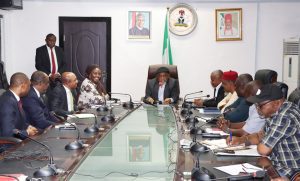The Minister of Labour and Employment, Chris Ngige, has met with the leadership of the Nigeria Labour Congress and the Central Bank of Nigeria.
The move is to avert NLC’s nationwide strike and picketing of the apex bank’s offices nationwide from Wednesday.
The crux of the matter is the cash crunch occasioned by the CBN’s Naira redesign policy.
A statement by the Ministry on Monday said the CBN has taken measures to ease the hardship being faced by Nigerians as a result of scarcity of naira notes.
 It said large volume of funds have been made available to the deposit money banks and have been directed to open their branches on Saturdays and Sundays under strict supervision by the CBN.
It said large volume of funds have been made available to the deposit money banks and have been directed to open their branches on Saturdays and Sundays under strict supervision by the CBN.
The statement quoted the CBN Governor, Godwin Emefiele, as saying the steps taken so far have led to Nigerians enjoying their money.
Similarly, the statement said the National Executive Committee of NLC would meet on Tuesday where members from states and Local Government Areas would report on availability of money, after which a decision will be taken on the strike.
MIXED REACTION TRAIL WEEKEND OPERATIONS OF BANK
Mixed reactions have trailed weekend operations by banks as directed by the Central Bank to ease the cash crunch situation in the country.
While some customers are glad with just getting any amount of cash others are unhappy that the amount dispensed to them is small.
It’s a weekend and the banks in the capital city are operating as directed by the CBN.
The crowd that had become common sight outside the branches are no where to be found.
A few customers are seen entering the banking halls and coming out with ease, but not all of them are happy.
This man for example says he was only able to withdraw a fraction of what he needs and worse still most of the notes are mutilated.
But it’s different strokes for different folks, as some customers feel the prolonged absence of cash helped check their needless spending and the amount being dispensed at the moment is just enough.
The journey to the bank was fruitless for some as their financial institutions had network issues and receiving cash across the counter was simply impossible.
Though some automated teller machines neither had cash nor were dispensing, some however had and customers waited patiently on the queue for their turn .
A few complained of not being able to make withdrawals beyond two thousand naira per try and they see this as a deliberate act of exploitation by the banks.
The hitches here and there notwithstanding, the customers are generally glad about the development and hope it is sustained.




